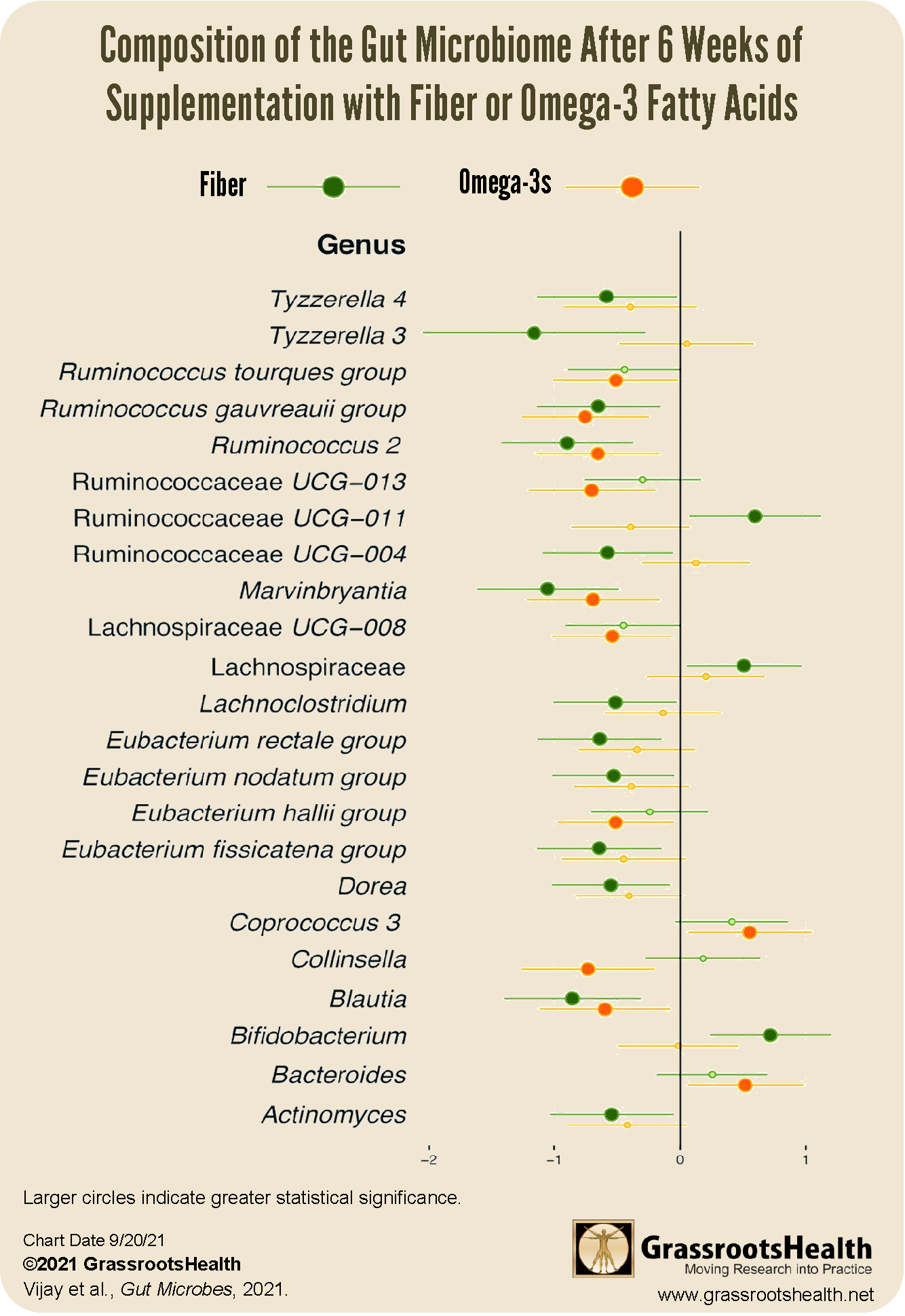Published on September 21, 2021
Study reveals effects of 6 weeks of omega-3 supplementation on the composition and function of the gut microbiome
Key Points
- The microbiome and the metabolites it produces can have multiple effects on overall health, from our digestion, to cardiovascular health, to the brain and nervous system, and more
- Prebiotics such as fiber are nutritional compounds that affect the microbiome
- A new study shows 500 mg/day omega-3s had similar prebiotic effects as 20 g/day of fiber
- This study concludes that omega-3s have the ability to create positive and significant changes to the microbiome and its metabolites

Your gastrointestinal tract is home to trillions of microbes (bacteria, viruses, and yeast), called your microbiome, which act as their own “organ” and are crucial to your overall health. Your microbiome plays important roles in training your immune system, preventing disease-causing bacteria from taking up residence, controlling the digestion of food, producing nutrients for our absorption, interacting with your central nervous system, and influencing other bodily processes.
What we eat can affect the composition of the microbiome (what types and how much of each “bug” we have living in our guts), and also contributes to the metabolites, or by-products, they create within us. These metabolites are released from the gut into circulation, and are commonly found in the form of short and branched chain fatty acids. Once in circulation, they have the ability to create functional changes that affect overall health, from the cardiovascular system to our brain and nervous system.
Prebiotics are nutritional compounds that are known to benefit health through their effects on the microbiome and its metabolites. The fiber inulin is a well-known prebiotic, often promoted specifically for altering the microbiome in a favorable manner. Recent research is now showing that omega-3 fatty acids have a similar prebiotic effect.
Randomized Controlled Trial Compares Effects of Fiber and Omega-3s on the Microbiome
In a study by Vijay et al., 69 participants were randomized to receive either 500 mg per day of omega-3 fatty acids (EPA + DHA) for 6 weeks, or 20 g per day of an inulin (fiber) supplement for 6 weeks. Stool samples were collected to measure the changes in the intestinal microbiome, and blood samples were collected to measure the metabolites derived from the microbiome. Samples were collected at baseline and at follow-up visits.
As can be seen in the forest plot above, the effects of omega-3 supplementation on the composition of the microbiome were very similar to those from taking fiber supplements.
Several specific findings included the following:
- Omega-3 supplementation had the most significant effect on Coprococcus and Bacteroides
- Fiber supplementation significantly increased Bifidobacterium, Ruminococcaceae, and Lachnospiraceae family bacteria, as well as butyrate production
- Significant increases in certain short-chain fatty acids (SCFAs) and branched-chain fatty acids (BCFAs) were seen for both the omega-3 and fiber supplementation groups
- Many of the changes in SCFAs and BCFAs with omega-3 supplementation were negatively associated with serum lipids, and increases in certain bacteria were negatively associated with markers of cardiovascular disease
Overall, this study showed that supplementing with omega-3 fatty acids resulted in similarly positive and significant changes within the gut microbiome and its byproducts when compared to supplementing with inulin fiber, a well-known prebiotic supplement. This indicates that omega-3s may also have prebiotic effects within the body, which is just another avenue through which omega-3 fatty acids can make an impact on our overall health.
Make Sure Your Gut AND Your Body Are Getting Enough Omega-3s and Other Important Nutrients
 Studies have shown that vitamin D and sunlight also have positive effects on the health and diversity of the microbiome. Having and maintaining healthy vitamin D, omega-3, and other nutrient levels can help improve your health now and for your future. Choose which to measure, such as your vitamin D, omega-3s, and essential minerals including magnesium and zinc, by creating your custom home test kit today. Take steps to improve the status of each of these measurements to benefit your overall health. You can also track your own intakes, symptoms and results to see what works best for YOU.
Studies have shown that vitamin D and sunlight also have positive effects on the health and diversity of the microbiome. Having and maintaining healthy vitamin D, omega-3, and other nutrient levels can help improve your health now and for your future. Choose which to measure, such as your vitamin D, omega-3s, and essential minerals including magnesium and zinc, by creating your custom home test kit today. Take steps to improve the status of each of these measurements to benefit your overall health. You can also track your own intakes, symptoms and results to see what works best for YOU.
Enroll and test your levels today, learn what steps to take to improve your status of vitamin D (see below) and other nutrients and blood markers, and take action! By enrolling in the GrassrootsHealth projects, you are not only contributing valuable information to everyone, you are also gaining knowledge about how you could improve your own health through measuring and tracking your nutrient status, and educating yourself on how to improve it.
Help everyone Move Research into Practice with vitamin D and other nutrients! As a special birthday gift to everyone, in honor of the science, we have created a special scholarship fund for anyone to donate to that will go towards helping others participate. Your donation will allow anyone to get help with funding their participation when they need it.
Text-to-give: Text Daction to 44321 to add to our Scholarship Fund.






